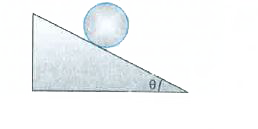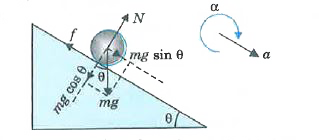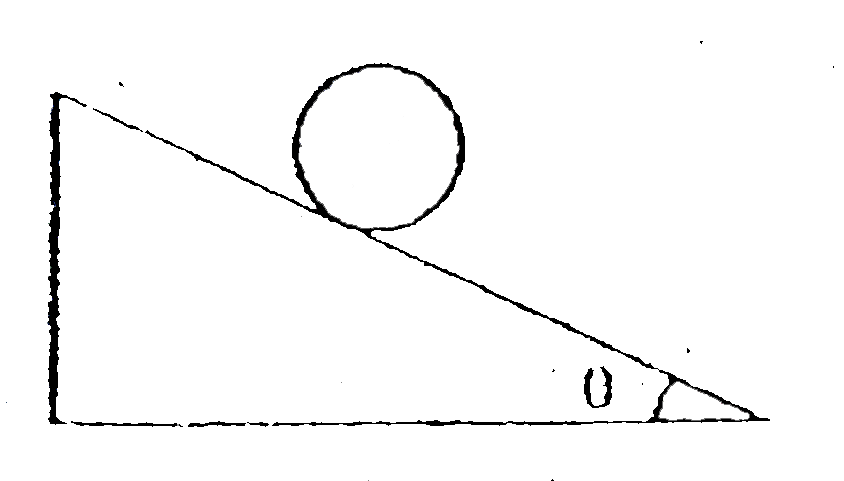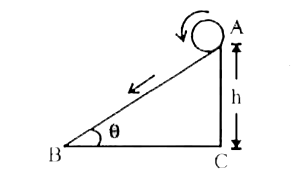A solid cylinder is rolling down the inclined plane without slipping. Which of the following isare correct?

The friction force is dissipative
The friction force is necessarily changing
The friction force will aid rotation but hinder translation
The friction force is reduced, if ~theta~ reduced
The correct Answer is:C, D

Friction acts up the plane hence it hinders translation. But torque of friction produces rotation. So we can understand that option (c) is correct. We can write the following equations:
mgsinθ−f=ma ...(i)
=(12mr2)(ar)⇒f=12ma .....(ii)
On solving the above two equations we get friction:
f=13mgsinθ.hence magnitude of friction reduces when θ is reduced. So option (d) is also correct.
Topper's Solved these Questions
- SYSTEMS OF PARTICLES AND ROTATIONAL MOTIONBOOK - MODERN PUBLICATIONCHAPTER - SYSTEMS OF PARTICLES AND ROTATIONAL MOTIONEXERCISE - COMPETITION FILE (OBJECTIVE TYPE QUESTIONS (ASSERTION REASON TYPE QUESTIONS) )
10 Videos
- SYSTEMS OF PARTICLES AND ROTATIONAL MOTIONBOOK - MODERN PUBLICATIONCHAPTER - SYSTEMS OF PARTICLES AND ROTATIONAL MOTIONEXERCISE - COMPETITION FILE ( OBJECTIVE TYPE QUESTIONS (MATCHING TYPE QUESTIONS) )
3 Videos
- SYSTEMS OF PARTICLES AND ROTATIONAL MOTIONBOOK - MODERN PUBLICATIONCHAPTER - SYSTEMS OF PARTICLES AND ROTATIONAL MOTIONEXERCISE - COMPETITION FILE ( OBJECTIVE TYPE QUESTIONS (JEE (Main) & Other State Boards for Engineering Entrance) )
48 Videos
- PHYSICAL WORLD BOOK - MODERN PUBLICATIONCHAPTER - PHYSICAL WORLD EXERCISE - Revision exercises (Long answer questions)
6 Videos
- THERMAL PROPERTIES OF MATTERBOOK - MODERN PUBLICATIONCHAPTER - THERMAL PROPERTIES OF MATTEREXERCISE - CHAPTER PRACTICE TEST
15 Videos
Similar Questions
Consider a situation in which a ring, a solid cylinder and a solid sphere roll down on the same inclined plane without slipping. Assume that they start rolling from rest and having identical diameter.
The correct statement for this situation is:-
View SolutionA ring, a solid cylinder and sphere are rolled down on an inclined plane without slipping. Velocity of centre of mass is
View Solution
Knowledge Check
A solid cylinder is rolling down the inclined plane without slipping. Which of the following is correct?
 AThe friction force is dissipativeBThe friction force is necessarity changingCThe friction force will aid rotation but hinder translationDThe friction force is increased if θ is reduced
AThe friction force is dissipativeBThe friction force is necessarity changingCThe friction force will aid rotation but hinder translationDThe friction force is increased if θ is reducedIf a solid cylinder rolls down an inclined plane, then its:
Arotational energy is 1/3 and the translational energy 2/3 of its total K.E.Btranslational energy is 1/3 and rotational energy is 2/3 of its total K.E.Crotational and translational energies are equal.Dentire energy is rotational K.E.A solid cylinder is rolling down a rough inclined plane of inclination θ. Then
AThe friction force is dissipativeBThe friction force is necessarily changingCThe friction force will aid rotation but hinder translationDThe friction force is reduced if θ is reduced
A solid sphere of mass M and radius R, rolling down a smooth inclined plane, without slipping, reaches the bottom with a velocity v. What is the height of the inclined plane in terms of the velocity v ?

View SolutionAn inclined plane makes an angle 30° with the horizontal. A solid sphere rolling down this inclined plane from rest without slipping has a linear acceleration equal to
View SolutionThree bodies , a ring , a solid cylinder and a solid sphere roll down the same inclined plane without slipping . They start from rest . The radii of the bodies are identical . Which of the bodies reaches the ground with maximum velocity ?
View SolutionAn inclined plane makes an angle 30° with the horizontal. A solid sphere rolling down this inclined plane from rest without slipping has a linear acceleration equal to
View SolutionA sphere is rolling down an inclined plane without slipping. The ratio of rotational kinetic energy to total kinetic energy is
View Solution
